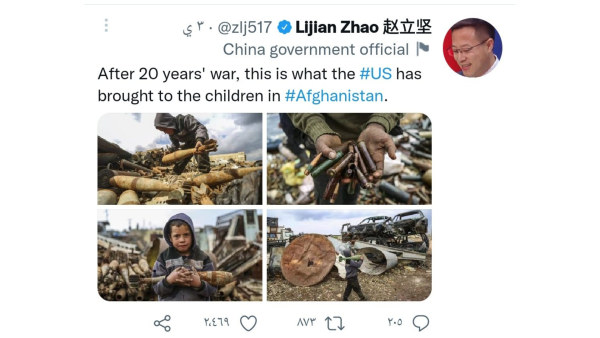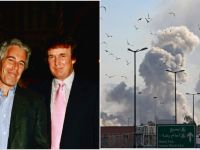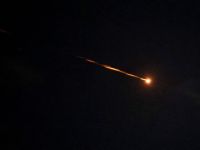Last week, a Chinese government official stirred social media anger after sharing photos from Syria claiming they were taken in Afghanistan before he took his tweet down.
Spokesperson of the Chinese Foreign Ministry Lijian Zhao tweeted four photos featuring children holding bullets and remains of missiles and bombs, saying it "shows the aftermath of 20 years of war in US-led war in Afghanistan."
A Chinese Foreign Ministry spokesman has published @zlj517,photos taken by me in Idlib and claims that 'this is what the United States brought to the children in Afghanistan', but in fact, this is what the Syrian regime and Russian forces brought to the children in Idlib. https://t.co/lq2hGE66Cv pic.twitter.com/phAQVStXwb
— Ali Haj Suleiman (@AliHajSuleiman) January 27, 2022
However, online people were quick to flag the wrong location of the photos, especially after Idlib-based Syrian photojournalist, Ali Haj Suleiman, retweeted Zhao's post, saying he is the one who took these photos and that they were not from Afghanistan, but rather of war-torn Syria, where China supports the Russian-backed Syrian regime responsible for many massacres since 2011.
Will @zlj517 apologise to 1) @AliHajSuleiman for using his photos of suffering children in Idlib for Afghanistan propaganda purposes 2) the global public for misleading it? https://t.co/ilZYIQK2tK
— Elisabeth Braw (@elisabethbraw) January 29, 2022
Lijian Zhao then removed his tweet but the controversy continued with commentators discussing the difficulty of tracking such claims of social media, especially ones that trigger strong reactions and push for political agendas.
若要人不知,唔好太低B
— Yume 夢子貓 (@yumepurpleneko) January 28, 2022
China said Children are Afghanistan who suffered from US(?), but they are Syrian suffered from Russian. The real photographer explained. https://t.co/DO5IcaL4cB
CCP is stealing, again pic.twitter.com/9FjB6A9Mb2
— 小白鼠先生? (@shiroihamusan) January 28, 2022
Others weighed on the legal consequences of using the work of photojournalists on social media without attributing it to them, especially by officials such as the Chinese government spokesperson, highlighting similar incidents in which Chinese media used videos and photos on social media without crediting photographers.







